

... Harry Brown
By Scott Stilphen
While programmers have slowly gained recognition for their efforts over the years, such is not the case with video game testers. They are the unknown, unsung heroes of the industry. Harry Brown started his career at Atari as one such tester, eventually becoming a programmer. He even came up with an idea to become the “King of Vegas” thanks to some clever coding, before leaving for greener pastures (literally). Oh yeah, and he also single-handedly captured Moscow. Intrigued? Read on…
DP: What inspired you to pursue a career in programming?
Harry Brown: I bought a TRS-80 in the late 70's and tinkered around on it in the hotel room when traveling around caddying. When the Atari 800 came out I figured it was the best and bluffed my way into the CES show in Las Vegas and talked to the guys working the Atari booth. Mike Lorenzen told me Atari was a fun place to work and they were hiring game testers.
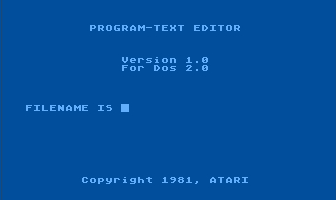
DP: I never realized Mike worked at Atari before going to Activision. Do you recall what he did?
Harry Brown: The thing I remember best of his wasn't a game but a text editor called Medit, for “Mike’s Editor”. It was way more useful for editing code than anything else at the time. I don't know if Atari released it or if he just passed it around (Ed. It was released under the APX label. It may have also been known by the name Program-Text Editor). I think of how good it was every time I try to highlight a string of text using MS Word and I click exactly where I want to start of finish and Word then highlights the whole line, or jumps over 5 spaces and gets the next letter too. With Mike's editor you highlighted exactly what you selected and nothing more. Sometimes simplicity is elegant.
DP: When did you start at Atari, and what were your duties there?
Harry Brown: I think I was at Atari from 1981 through early 1983. I began as a game tester for all divisions including the Coin-op. We were working in trailers at the main headquarters. Later they bought up lots of office space and I was put in the Home Computer division, which was fine because I liked the Atari 800 a lot. I taught myself (and bugged Chris Crawford and Lane Winner and others for knowledge) to program in assembly language. The game testers had regular hours, but since I 'lived' there I don't remember what they were.
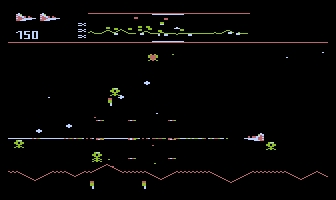
My first project was so boring, as I was interested in games. It was a series of development tools (I did a player-missile editor) which were never released because we took so long to do them, and because there were commercial products that beat us to market. The project leader was Ken Balthaser and when we finished he switched me to a new leader: The one guy he knew I didn't get along with and a programmer who couldn't write code. This was nearly the end for me. I was pretty disenchanted with the whole place anyways - mostly people doing nothing and the talented ones moving on to other jobs. I wanted to change divisions but it seems there was an agreement between managers not to let the programmers move around.
I also helped convert some 8-bit computer games to the Atari 5200, such as Defender. I didn't do much, just the controllers and getting it started from a different OS.
DP: How many testers were there (approximately)? Did they all work for the different divisions?
Harry Brown: Hmm. I don’t recall how many testers there were, and I'm not sure we had the different divisions until after I had worked there for awhile. You’d need to ask the management types about that.
DP: Were there any games or projects that you worked on that ultimately never got released or even finished?
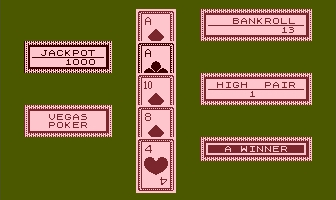 Harry Brown:
The only game I did was a video poker machine simulator -Vegas Poker -
that was never released because Atari didn't offer me anything for it; I had
signed a clause when I joined saying whatever I did belonged to them. At least
they didn't try to grab it and not pay. That game was a big project for me. I
worked on it almost all my spare time for 6 months. I was learning assembly
programming for the 6502 as well as the Atari 800 computer itself. However the
bosses at Atari liked it enough to make me a programmer. A few years ago a
company called Video 61 started selling cartridges of it (under the title
Video Poker -
www.atarisales.com - $19.95 plus $5 S&H). I even got a commission check
from them.
Harry Brown:
The only game I did was a video poker machine simulator -Vegas Poker -
that was never released because Atari didn't offer me anything for it; I had
signed a clause when I joined saying whatever I did belonged to them. At least
they didn't try to grab it and not pay. That game was a big project for me. I
worked on it almost all my spare time for 6 months. I was learning assembly
programming for the 6502 as well as the Atari 800 computer itself. However the
bosses at Atari liked it enough to make me a programmer. A few years ago a
company called Video 61 started selling cartridges of it (under the title
Video Poker -
www.atarisales.com - $19.95 plus $5 S&H). I even got a commission check
from them.
I also worked on a laserdisc project that made it into a few retail stores. It used an Atari 800 with a custom interface to control a Pioneer VP-1000 laserdisc player. Atari’s “Grass Valley” did the laserdisc interface, and I was in contact with the board designer to learn how to “talk” to it. Atari put the setup in a coin-op cabinet, and a special laser disk was made and the customer could click around and play different sections off the laserdisc. It was pretty boring stuff. Later I bought the Dragon's Lair and Space Ace disks and programmed my own version of those 2 games for my own amusement.
DP: The music in Vegas Poker is quite impressive! Do you recall any other details about it?
Harry Brown: Players are treated to the Peer Gynt Suite by Edvarg Greig and a progressive jackpot. I had thoughts of having this installed in bars. The customer could buy credits and cash out if he was a winner and have a chance at the progressive jackpot. I forget how it kept track of the jackpot between sessions?? I think you could save to floppy, but I thought the Atari 400 was the ideal bar poker machine, and if they were against the law the owner could claim it was just a video game.
I used to know
professional gamblers and I was the 1st I know of to identify that the
progressive slots in Vegas (they were fairly new at the time) could be beat,
just on pure math; once the jackpot got to a certain amount, it was to the
player's advantage. Of course you had to make the right plays, too so I did the
math and developed the best strategy for playing the game based on how the
machine paid out.
Since them many books have been written of course, but with my work, a friend
and his team would scour Las Vegas, looking for a bank of progressive machines
(several machines would contribute to and share the jackpot) where the jackpot
was in the profitable-to-play amount. They would then page everybody else in the
group and lock up all the machines involved. As soon as an outsider got up, a
team member would get that machine and the team would play however long it took
to win, with all the machines soon being played by the team. If it took a week,
that was ok as they had replacements to take over. I never played on a team. One
time I was at the Riviera and on the 2nd floor they had a Bingo
Parlor. Almost nobody ever went there except coming and going from the Bingo
which was mostly locals and only certain times of the day. I found a nickel
machine with the jackpot at about $500 which I knew was favorable, so I played
it all day, without hitting. I got real tired, went home and came back the next
day, thinking surely it would be hit. But it was at $1100 now which was unheard
of on a nickel machine. So I played all day again and finally hit it before
anybody else for $2002. I was so burnt out I never played again!
DP: A former Atari co-worker of yours, Bill Haslacher, mentioned you devised a neat trick to beat an early version of Chris Crawford’s game, Eastern Front. Can you explain what the trick was and how it worked?
Harry Brown:
I found out the AI used the time I was devising my next move to devise
its strategy as well. So all I did in my first move was to push all my forces
all the way to Moscow. I simply the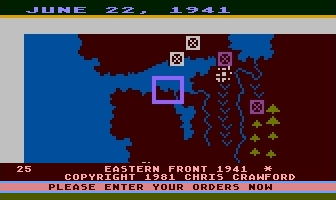 n pushed the Start key to complete my turn,
and I held it down. This denied the AI much time to plan ahead and it would make
dumb moves immediately. Since I didn't let up on the Start key, my next move
would automatically continue the march to Moscow and I was always successful
without so much as breaking a sweat. Chris was pissed at my trick so he likely
changed it before release.
n pushed the Start key to complete my turn,
and I held it down. This denied the AI much time to plan ahead and it would make
dumb moves immediately. Since I didn't let up on the Start key, my next move
would automatically continue the march to Moscow and I was always successful
without so much as breaking a sweat. Chris was pissed at my trick so he likely
changed it before release.
Chris was the brightest guy I worked with but he was narrow in his focus. He wrote games that he liked and that appealed to his intellect, but were not mainstream titles. But he had the leverage and sense to not sign the same agreement I did when he hired on, and was able to write software for other companies (such as Avalon Hill) while at Atari. I recall when we had group meetings, he would leave his notebook open on the table with royalty checks exposed for us to gawk over... all subtly intentional I'm sure.
DP: Did you include any “Easter eggs” or hidden features in any of your games/programs?
Harry Brown: In Vegas Poker there is a back door to the jackpot. The 2nd part of my plan, after these were installed all over the country, was to drive from bar to bar and win the progressive jackpot! The jackpot winning sequence was to move the joystick in a certain sequence before pressing the trigger to deal the next hand. It was something like forward, back, left, right, but I don't really remember. It wasn't quite that simple, but maybe you had to do that twice. I don't really remember (Ed: see the Easter egg section for the sequence on how to activate it.) Otherwise the game played fair. And you could set the payouts to whatever you wanted. But once you dealt a hand it played honestly, dealing random cards from a 52 card deck. (Ed: This is only true for the initial deal. Any cards that are drawn/replaced are already predetermined before you press the fire button. This can be proven by using the ‘save state’ function in emulators.)
DP: What were some of your experiences working for Atari? Any stories or anecdotes from those days that you recall off the top of your head?
Harry Brown: My memory fades about my Atari days. All I can tell you is about managers coming and going and new organizational charts every few months. Managers loved to hire people right before they moved on (does that make your resume look better?) and they loved to hire very boring people from Control Data Corporation.
I can remember people who only came to work on Friday (payday), others who played guitar in their cubicle all day, a tech writer that spend 1 year typing the Atari 800 tech manual word for word into the CDC mainframe (it was supposed to be rewritten), a full-time 'librarian' so we could check out software titles the company bought, and of course Tod Frye who did the Atari 2600 version of Pac-man because the good programmers wanted to do original stuff. Many people walked, and the remaining ones got commissions on their games; Tod made almost 1 million on Pac-Man while all of Atari made less that year as the decline had started.
I think you could sum up Atari like this: all the technology was done before I got there. Once Warner bought the company all that was done was marketing to squeeze all the blood out of a turnip. Of course they weren't even very good at that, assuming people would forever be enchanted with little stick figures bouncing around on a TV screen. Isn't it amazing what a piece of crap the 5200 was? They called that the next generation? And how about the 800 XL and Atari 7800? See what I mean about Warner being a marketing company? All they could do was repackage the technology they bought from Nolan Bushnell, and they were fools enough to believe that was good enough.
I will say they did have some nice artwork on the covers of the game boxes. I could have used some help with the game graphics, but the professional artists were busy doing boxes.
The most important thing about Atari was documented in a book by Connie Bruck about Warner Chairman Steven Ross. He was the 1st big scale corporate thief who bribed his henchmen on the board and stole 7.5 times more 'pay' that the next highest CEO in corporate America in about 1981 or so: $22.7 million I think it was. Since nothing happened to him, other CEO's followed suit and you can see what has happened since.
DP: Why did you ultimately leave Atari?
Harry Brown:
I remember I was offered Robotron: 2084 to do about the time I
quit. I frankly didn't think the 800 had the resources to do it but somebody
else did - not in house, though. I hear it was a gal in NY. I was impressed by
it (Ed: Atari programmer Judy Bogart did Robotron). Instead I wanted to do something original and in the tradition of the VCS
guys. I wanted to just fiddle around and write and let it evolve. The new
bosses at the time were now from the Marketing side of the building, and they
kept throwing these forms at me. I was to plan the whole project out ahead of
time like you
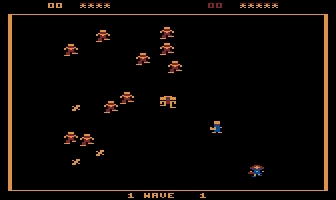 would with a movie script. We had a meeting and some Madison
Avenue type then started playing movie director with me and telling me about a
game in his head, but he hadn't learned the 1st thing about the 800 computer. He
was just using his imagination and expecting me to do whatever came to his mind!
would with a movie script. We had a meeting and some Madison
Avenue type then started playing movie director with me and telling me about a
game in his head, but he hadn't learned the 1st thing about the 800 computer. He
was just using his imagination and expecting me to do whatever came to his mind!
Then they promoted Clyde Grossman from Project leader of the tools group (which
I suffered through for 6 months) to be my supervisor. Clyde was a failure at
writing code so that's why they made him project leader. I told Ken Balthauser,
my supervisor, that I would never work with Clyde again when we got done with
the tools. So I guess this was a message to me to leave and I did right after X-mas
bonus time. I had taken my Atari "Phantom Stock" (sort of like options, but you
had to stay a few more years and Warner stock would have to go way up for them
to be vested) and tacked it on the bulletin board before this happened with an
offer to 'help yourself' to my shares.
I could have hung on for another 6 months, I guess. That's when most of the rest
got fired, as Atari was losing 500 million that year, which was a lot in 1985. I
think Lane Winner might have been the last to go. Lane was the Guru of both
hardware and software. He didn't do much that I remember in terms of product,
but he was there to answer all questions and he was good. Joe Miller was
another. He wrote a lot of the modem software. He was talented, and would spend
the wee hours in his office writing code, listening to good music, and smoking
cigarettes. It was great to have company as I actually lived at Atari for much
of the time. They had showers there and I had a nice custom van with a bed in
it. I was spending so much time there I just never got a place of my own for the
1st year. And I had the ATARI license places. That's right - my California
plates were the one and only ATARI.
I don’t mean to sound so critical of Atari, as not everyone was included in the ‘den of incompetence’. There were a lot of talented people who unfortunately were powerless to make a difference. The VCS programmers who left to form Activision and Imagic were bright guys, as were those in the coin-op division. As far as the computer and VCS divisions, management changed every 6 months or less in the time I worked there; they were consumed with “empire building” (hiring people) instead of producing anything. I wasn't knowledgeable enough to give many details but I think history has pretty much shown Atari blew a monopoly in the lucrative video game business.
DP: Where did you go after that?
Harry Brown: After I quit I moved to Carmel and started writing a golf game for the Atari 800. It was to be different then the ones that became so popular. Mine was based on my knowledge of golf strategy and tactics so to be good one would have to learn that stuff, rather than the mouse or joystick timing stuff that won out.
I had
interviewed with Broderbund and all they offered me was a job writing for the
Apple 2 since I knew 6502 Assembly language. But I didn't know that machine and
I'd heard about the Amiga which was still in development and I tried to get
Broderbund to let me work on that but they already had a staff for that. So I
worked for myself but after a couple months my sources told me that I was
wasting my time writing for the Atari 800 as it was dead in the water and they
were right. I never finished the game.
So in early 1984, I decided to do some caddying on the PGA TOUR, which I'd done
before Atari, and did the West Coast Swing with a youngster named David Edwards.
He won the LA Open, and then went on to Finish 2nd in Dallas and 3rd at the
Masters, and I was hooked on that again. Currently I caddy on the Seniors
Champions Tour and I'm much happier as a computer user than a programmer. There
just isn't time enough to do everything and I'm still a computer nerd but only
from a user standpoint.
DP: Do you still own any of your games for these systems, either as a keepsake, or to show friends or family?
Harry Brown: There is a collector from NY who took all my laserdisc kiosk/materials- Kirk something. He had a website but it’s likely gone.
DP: What were some of your favorite games?
Harry Brown: Wizard of Wor was addictive for the Amiga. Stunt Car Racer never made it big but I thought it was great. I also liked Defender and Hacker. From that era though, I liked the adventure games the best.
| GAMEOLOGY |
| GAME | SYSTEM | COMPANY | STATUS |
| player-missile editor | Atari 400/800 | Atari | released (internally) |
| Defender (5200 conversion) | Atari 400/800 | Atari | released |
| Vegas Poker | Atari 400/800 | Atari | unreleased |
| laserdisc kiosk project | store kiosk | Atari | released (stores only) |
| "golf game" | Atari 400/800 | Atari | not completed |